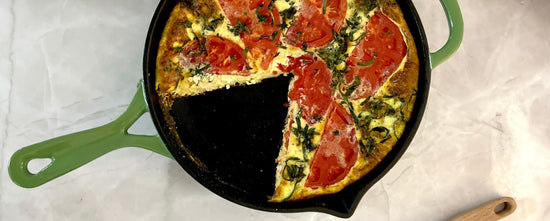
How to Clean Your Enameled Cast Iron Cookware
When it comes to cleaning your cookware, it's best to research the best practices for your specific style and material. For example, directions on how to clean your nonstick cookware will be very different from how to clean your cast iron, copper, or stainless steel cookware. Please keep in mind we will be discussing the best care guide for enameled cast iron cookware only, not traditional cast iron. So first, let's discuss the differences between enameled cast iron and traditional cast iron.
Traditional Cast Iron:
- No color options as it has no enamel coating
- Seasoning required between uses
- Can easily rust when unseasoned
Enameled Cast Iron:
- Offers a variety of enameled color options
- No seasoning required
- Enamel coating prevents rusting
Basics of Cleaning Enamelware
Our first piece of advice is that no amount of hand scrubbing will be as powerful as a nice soak. Rather than beating yourself up over a tough stain, first let it soak in warm soapy water and you might be surprised just how much easier doing the dishes has become.
After all, that may be our most important piece of advice. Cleaning your enameled cast iron cookware is easier than you'd think. There are truly only two key tips you must remember:
- Do not use a steel wool scrubber as it will damage the coating. We recommend soft sponges.
- Be sure to hand wash to avoid chips and scratches that could happen in the dishwasher.
5 Steps to Clean Tough Stains
We all have had our fair share of tough stains that won't budge. Luckily, our team here at Larder & Vine has found the best way to tackle these unwanted stains. Following these 5 simple steps can help keep your cookware in prime condition to last for generations.
- After use, it’s important to let your cookware cool completely before cleaning.
- Soak with hot water, dish soap, and 2 tablespoons of baking soda.
- Cover and let sit for 15 to 20 minutes.
- Pour out the liquid and wipe clean with a gentle dish scrubber or sponge. Avoid using a steel sponge as this is harmful to the coating.
- Wash once more with warm water and dish soap before rinsing.
If the toughest stains still stick around, apply baking soda directly to the stains, add a few drops of water to create a paste, and scrub gently with a sponge or your fingers. This will help break down those tough stains. Rinse once more with soapy water to ensure your cookware is fully clean.
After Cleaning Care Guide
Keeping your enameled cast iron cookware in prime condition takes more than just keeping it clean. You must keep in mind the type of utensils you are using, how you store the cookware, and more.
Just like during cleaning, you won't want to use any utensils that may scrape or damage it's enamel coating. Using metal utensils can easily chip and scratch your cookware, so we recommend using wooden, silicone, or nylon utensils instead. These materials are much softer and don't cause damage to the coating like metal does.
Unlike your copper pots stacked in the cabinets, we strongly encourage you to never stack your enameled cast iron cookware, even with other types of cookware. Doing this can cause unwanted chips and dents. Although these dents won't affect the quality of your cooking, nobody wants to find any sort of defect on their heirloom-quality cookware. We took a precautionary step to avoid chips by supplying you with black protective clips on cookware that comes with a lid. Be sure to keep these clips to use when storing your cookware.
If you must stack your cookware based off your storage space, we highly recommend using a towel as a barrier to protect against any damage.















